|
|
|
Sort Order |
|
|
|
Items / Page
|
|
|
|
|
|
|
| Srl | Item |
| 1 |
ID:
138991
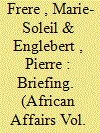

|
|
|
|
|
| Summary/Abstract |
BLAISE COMPAORÉ RESIGNED AND FLED BURKINA FASO on 31 October 2014 under the sustained assault of a coalition of youth, cultural leaders, civil society organizations and opposition parties, and after the defection of core segments of his military. Compaoré had been in power since the assassination of his predecessor Thomas Sankara on 15 October 1987. This briefing first discusses the actual sequence of events that led to the transition. We then identify some deeper trends that weakened the regime, including the dilemma of succession in a semi-authoritarian regime, the rise of youth and cultural elites as opposition actors who placed themselves beyond the reach of regime co-optation, and the use of Sankara imagery as a tool of mobilization. We then jointly analyse two features of the transition and the current regime of Lt-Col Isaac Yacouba Zida who, despite being only prime minister, appears to be the country’s new strongman. The first is the relative institutional uncertainty that accompanied the fall of the Compaoré regime and which continues to hamper the transition. The second is the enduring role of the military in Burkinabè politics. We conclude by singling out some implications of the transition and the challenges ahead.
|
|
|
|
|
|
|
|
|
|
|
|
|
|
|
|
| 2 |
ID:
180219
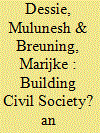

|
|
|
|
|
| Summary/Abstract |
A key part of Ethiopian Prime Minister Abiy Ahmed’s effort to promote the development of civil society is a new law, proclamation 1113/2019, which significantly expands the allowed activities of civil society organizations (CSOs) – especially in comparison to the earlier 2009 law. We examine the genesis of the new law, which was promulgated after the wave of protests in 2016–2019, as well as its impact on the ability of CSOs to work on advocacy of human rights and democracy promotion. The article concludes with an assessment of the new law’s role in the possible expansion of the development of CSOs in the country.
|
|
|
|
|
|
|
|
|
|
|
|
|
|
|
|
| 3 |
ID:
146264
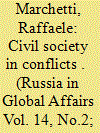

|
|
|
|
|
| Summary/Abstract |
Civil society actors have become key players in conflicts, especially in intra-state ones. This has been facilitated by the transformation of conflicts, increasingly characterized by high-intensity intra-border ethno-religious tensions and strong international influence by proxy. The usual take on conflicts focuses on the role of governmental actors, both national and international. Accordingly, violence and peace are usually considered to be determined above all by the political decisions of official institutions alone. While this remains partly true, in this paper I examine the other side of the coin: the non-governmental component in conflicts. Civil society actors, or as I define them, conflict society organizations, are increasingly central in view of the high degree of complexity of contemporary conflicts. These are conflicts that can only be understood by combining macro with micro approaches that focus on society. It is thanks to the latter approach that it is possible to unpack the political inputs, be they good or bad, which emerge from below, from the civil society domain, and scale up to the top political echelons. This is even more so in societies that are highly fragmented and deprived of stable governing institutions. It is in failing states such as those undergoing an ethno-political conflict that much of politics unfolds "on the ground." Hence it is there, at the micro level, that we need to explore
|
|
|
|
|
|
|
|
|
|
|
|
|
|
|
|
| 4 |
ID:
109129


|
|
|
|
|
| Publication |
2011.
|
| Summary/Abstract |
The aim of this article is to analyze critically the implications of Malawi's changing nature of politics on civil society organizations (CSOs). The article seeks to clarify whether or not the social, political and economic engagement of civil society organizations has contributed to a strengthened relationship between Malawi' government and its own development agenda, given the CSOs' dependence on 'Northern' aid agencies and/or international NGOs. The article argues that while the change from dictatorial regimes to a multiparty political system has enhanced civil society participation in Malawi's social, economic and political issues, the CSO-government relationship is still fraught with suspicion and mistrust.
|
|
|
|
|
|
|
|
|
|
|
|
|
|
|
|
| 5 |
ID:
112516
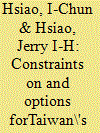

|
|
|
|
|
| Publication |
2011.
|
| Summary/Abstract |
In 2009 Taiwan became an observer to the World Health Assembly (WHA), the first time it had officially participated in a United Nations (UN) -affiliated body since 1971. Encouraged by this success, Taiwan has sought to replicate the WHA model for other UN bodies such as the UN Framework Convention on Climate Change (UNFCCC) and the International Civil Aviation Organization (ICAO). Unfortunately, this breakthrough has not yet paved the way for Taiwan's participation in more Unaffiliated bodies. This paper analyzes (I) the WHA model and the concept of meaningful participation; (2) the four parameters (title, stat as, where. and how) Taiwan needs to consider in order to apply the WHA model to the specialized agencies of the UN; and (3) Taiwan's options for the future. This paper argues that to maximize Taiwan's chances of UN participation. the approach will not only have to take Mainland China's concerns into consideration, but also need" to be within the boundaries of the existing statutes and conventions without the need for a special exception to he made in Taiwan's favor . Hence, it is suggested that Taiwan should seek to join the ICAO, IMF. WSG, WHO, and WMO with official governmental representation while simultaneously encouraging its civil society organizations (CSOs) to participate as non-governmental organization (NGO) observers in the FAO, ILO, IFAD, IMO, ITU, UNESCO, UNIDO, UPU, WIPO, and UNWTO. It is hoped that this two-pronged approach will maximize and accelerate Taiwan's participation in the specialized agencies of the United Nations.
|
|
|
|
|
|
|
|
|
|
|
|
|
|
|
|
| 6 |
ID:
143797
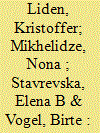

|
|
|
|
|
| Summary/Abstract |
From a peacebuilding perspective, EU support for civil society organizations (CSOs) in conflict-ridden countries can be criticized for artificially boosting a liberal, ‘bourgeois’ civil society at the expense of more representative initiatives at the grassroots level. Seen from a governance perspective, however, this criticism is lacking in nuance and conceals the actual rationale and effects of the support. To advance a realistic debate on international peacebuilding as a form of governance, this article investigates what the character and effects of EU support for CSOs in conflict-ridden countries actually are: how does it affect the relations between the supported organizations and (1) the wider society, (2) the state and (3) between the recipient country and the EU? We consider four ideal types of EU conflict governance: ‘liberal peace’, ‘hollow hegemony’, ‘vibrant hegemony’ and ‘post-liberal peace’ and compare them to empirical data from Bosnia and Herzegovina, Cyprus and Georgia. We find that while the objectives of promoting peace and democracy through CSO support tend to fail, the strategic interests of the EU are still maintained.
|
|
|
|
|
|
|
|
|
|
|
|
|
|
|
|
| 7 |
ID:
183236
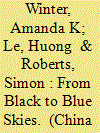

|
|
|
|
|
| Summary/Abstract |
This paper explores the perception and politics of air pollution in Shanghai. We present a qualitative case study based on a literature review of relevant policies and research on civil society and air pollution, in dialogue with air quality indexes and field research data. We engage with the concept of China's authoritarian environmentalism and the political context of ecological civilization. We find that discussions about air pollution are often placed in a frame that is both locally temporal (environment) and internationally developmentalist (economy). We raise questions from an example of three applications with different presentations of air quality index measures for the same time and place. This example and frame highlight the central role and connection between technology, data and evidence, and pollution visibility in the case of the perception of air pollution. Our findings then point to two gaps in authoritarian environmentalism research, revealing a need to better understand (1) the role of technology within this governance context, and (2) the tensions created from this non-participatory approach with ecological civilization, which calls for civil society participation.
|
|
|
|
|
|
|
|
|
|
|
|
|
|
|
|
| 8 |
ID:
112386
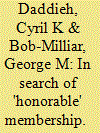

|
|
|
|
|
| Publication |
2012.
|
| Summary/Abstract |
With the increasing consolidation of her democracy, Ghana has, once again, become a cause for celebration and a source of pride in Africa. This newfound status as the bellwether state of African democracy makes Ghana ripe for a critical analysis of her democratic institutions. This article places the handling of parliamentary primaries by the two leading political parties in Ghana - the National Democratic Congress (NDC) and the New Patriotic Party (NPP) - under the microscope for closer scrutiny. The article interrogates the nature of these primaries, the procedures that govern their conduct, the factors that determine whether or not they are held, and the extent to which these parliamentary primaries have satisfied or deviated from democratic norms. It concludes that, while tremendous progress has been made in the candidate selection process by both major parties, there is plenty of room for improvement to ensure that the process is sufficiently empowering of voters in the constituencies and, hence, genuinely democratic.
|
|
|
|
|
|
|
|
|
|
|
|
|
|
|
|
| 9 |
ID:
178077
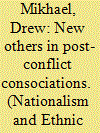

|
|
|
|
|
| Summary/Abstract |
Debates on consociationalism seek to explain how and why prescriptive power-sharing can support successful ethnic conflict management in post-conflict societies and if the differences between liberal and corporate consociationalism affect system stability. At the same time, a new and growing body of work has begun to examine the previously under-considered effects of power-sharing on “Others,” that is, those communities not in alignment with the included ethnic groups. This paper adds to understandings of liberal and corporate consociational models and their impact on a specific type of Other – “newcomers” – through interviews with civil society organizations representing their interests. Current approaches to the liberal-corporate distinction do not reflect the impact of institutional design on newcomers navigation of power-sharing systems. Through a comparative analysis of newcomer engagement in (liberal) Northern Ireland and (corporate) Lebanon, this paper will reveal how institutional design cultivates path-dependent elite behaviors that negatively impact newcomers through different policy responses.
|
|
|
|
|
|
|
|
|
|
|
|
|
|
|
|
| 10 |
ID:
179208
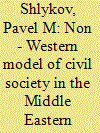

|
|
|
|
|
| Summary/Abstract |
The article analyzes the specific experience of civil society development in the Middle East, which remarkably exposes the dilemma underlying the civil society concept as a matrix of working democracy. This concept limits the understanding of the very phenomenon of civil society and peculiarities of its functioning in the region. An analysis of the Middle Eastern specifics requires a functional approach and a hybrid definition of civil society. This approach has a number of heuristic advantages over both liberal and critical theories. The article outlines the Middle Eastern model of civil society and postulates the key characteristic of illiberal civil society—it becomes conducive to the reproduction of authoritarian regimes even despite its institutional diversity. The analysis shows the ambivalence of civil society in the Middle East as a space of limited freedom of political/non-political activity and as a testing ground for the development of various tools designed to curb civic initiative. The liberal model of civil society, directly incorporated in state-building, is turned upside down in the Middle East. Civil society organizations in this region are hardly functional as an outpost for promoting liberal democratic values because they prove to serve the interests of the elite or alternative political forces much more than the interests of ordinary citizens.
|
|
|
|
|
|
|
|
|
|
|
|
|
|
|
|
| 11 |
ID:
175357
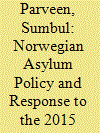

|
|
|
|
|
| Summary/Abstract |
In recent years, Norway has emerged as an important destination of asylum for refugees. During the refugee crisis of 2015, Norway, with a total population of slightly above 5 million, received more than 31,000 applications for asylum. This was close to the total number of asylum seekers it had received in the last three years. This article discusses Norway’s history as an asylum destination as well as policies for the protection and integration of refugees. It focuses on how the refugee crisis of 2015 unfolded in Norway. The domestic political discourse and the response of civil society organizations are analysed. The article also looks at the changes introduced in the asylum policy and the role of the European Union in determining Norway’s response to the crisis.
|
|
|
|
|
|
|
|
|
|
|
|
|
|
|
|
| 12 |
ID:
159600
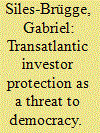

|
|
|
|
|
| Summary/Abstract |
A campaign by civil society organizations (CSOs) turned a relatively obscure area of international economic law—investor–state dispute settlement (ISDS)—into the focus of opposition to the Transatlantic Trade and Investment Partnership (TTIP) and later the European Union (EU)–Canada Comprehensive Economic and Trade Agreement (CETA). This article analyses how CSOs impacted on the EU’s position, while highlighting the limitations of their influence. Combining insights from constructivist International Political Economy literature with scholarship emphasizing the importance of emotions in advocacy framing, I contend that CSOs were able to create a polysemic ‘injustice frame’. The characterization of transatlantic ISDS as a threat to democracy and the rule of law aroused anger, while being ambiguous enough to garner widespread support. The ambiguity of CSOs’ advocacy frame and the concreteness of its target, however, were also the frame’s Achilles heel. These aspects provided space for the European Commission to reform a specific element of the agreement and thereby repair the latter’s overall legitimacy. The Commission’s counter-frame emphasized the reform’s democratic credentials by representing TTIP as an opportunity to move ISDS towards a system of ‘public law’. While this reframing failed to satisfy most opposition, it placated pivotal actors and allowed the Commission to move forward.
|
|
|
|
|
|
|
|
|
|
|
|
|
|
|
|
| 13 |
ID:
187049
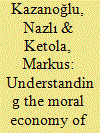

|
|
|
|
|
| Summary/Abstract |
The implementation of neoliberal welfare frameworks since the ascendancy of the Justice and Development Party in 2002 has led to a fundamental reorientation of the state-civil society relationship, where non-governmental organizations (NGOs) have been given wide-reaching roles in the delivery of welfare. In the field of family policy, the NGOs benefitting from such policies are largely faith-based organizations with close relationships with the AKP government. Based on interviews with Turkish women’s NGOs (WNGOs), this article studies the intersections of gender, family, civil society, and the state to shed light on the development of contemporary welfare policy in Turkey.
|
|
|
|
|
|
|
|
|
|
|
|
|
|
|
|
|
|
|
|
|